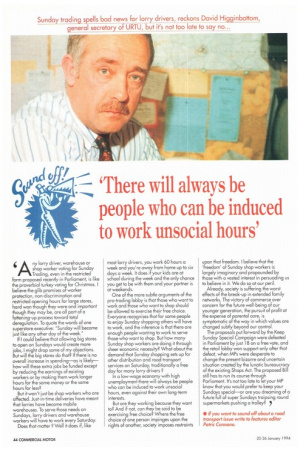'There will always be people who can be induced to work unsocial hours'
Page 46

If you've noticed an error in this article please click here to report it so we can fix it.
shop worker voting for Sunday
A ny lorry driver, warehouse or
shop worker voting for Sunday Trading, even in the restricted form proposed recently in Parliament, is like the proverbial turkey voting for Christmas. I believe the glib promises of worker protection, non-discrimination and restricted opening hours for large stores, hard won though they were and important though they may be, are all part of a fattening-up process toward total deregulation. To quote the words of one superstore executive: "Sunday will become just like any other day of the week." If I could believe that allowing big stores to open on Sundays would create more jobs, I might drop some of my objections. But will the big stores do that? If there is no overall increase in spending—as is likely— how will these extra jobs be funded except by reducing the earnings of existing workers or by making them work longer hours for the same money or the same Hours for less?
But it won't just be shop workers who are affected. Just-in-time deliveries have meant that lorries have become mobile warehouses. To serve those needs on Sundays, lorry drivers and warehouse workers will have to work every Saturday. Does that matter ? Well it does if, like most lorry drivers, you work 60 hours a week and you're away from home up to six days a week. It does if your kids are at school during the week and the only chance you get to be with them and your partner is at weekends.
One of the more subtle arguments of the pro-tradinglobby is that those who want to work and those who want to shop should be allowed to exercise their free choice. Everyone recognises that for some people to enjoy Sunday shopping others will have to work, and the inference is that there are enough people wanting to work to serve those who want to shop. But how many Sunday shop workers are doing it through sheer economic necessity? What about the demand that Sunday shopping sets up for other distribution and road transport services on Saturday, traditionally a free day for many lorry drivers ? In a low-wage economy with high unemployment there will always be people who can be induced to work unsocial hours, even against their own long-term interests.
But are they working because they want to? And if not, can they be said to be exercising Free choice? Where the free choice of one person impinges upon the rights of another, society imposes restraints upon that Freedom. I believe that the 'freedom' of Sunday shop workers is largely imaginary and propounded by those with a vested interest in persuading us to believe in it. We do so at our peril. Already, society is suffering the worst effects of the break-up in extended family networks. The victory of commerce over concern for the future well-being of our younger generation, the pursuit of profit at the expense of parental care, is symptomatic of the way in which values are changed subtly beyond our control.
The proposals put forward by the Keep Sunday Special Campaign were defeated in Parliament by just 18 on a free vote, and the retail lobby won support only after that defeat, when MPs were desperate to change the present bizarre and uncertain situation created by the lunatic bureaucracy of the existing Shops Act. The proposed Bill still has to run its course through Parliament. It's not too late to let your MP know that you would prefer to keep your Sundays special—or are you dreaming of a Future Full of super Sundays traipsing round supermarkets pushing a trolley?




















































































